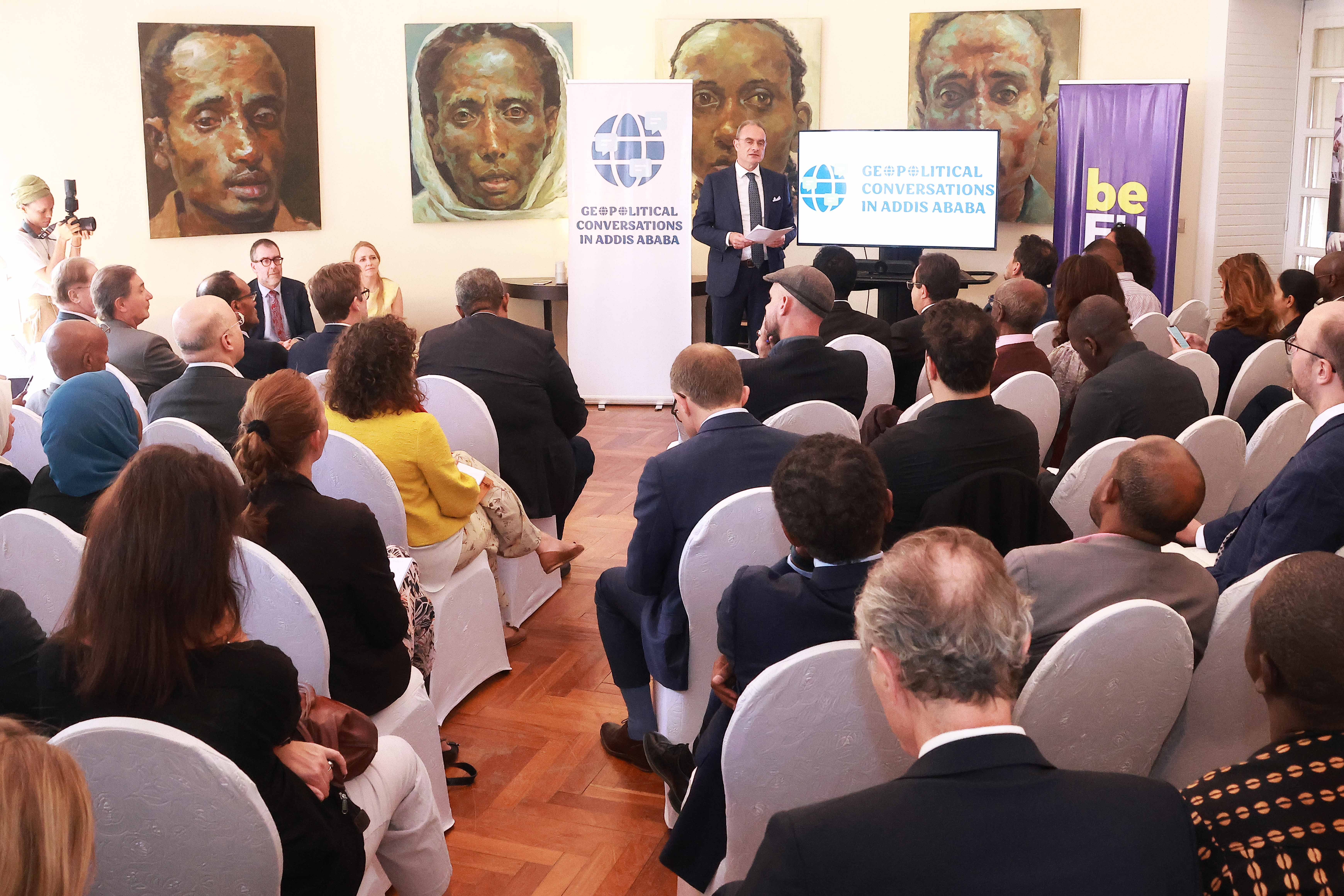
Viewpoints | May 11,2024
The emerging outsourcing sector, still in its infancy, is rapidly recognised as a critical component of the country's economic growth strategy. Federal authorities see potential in this sector for job creation, foreign exchange generation, and integration into the global market, positioning Ethiopia alongside African outsourcing powerhouses such as South Africa and Kenya.
According to Solomon Soka, a state minister for the Ministry of Labour & Skills, Ethiopia's prospects of becoming a globally competitive outsourcing destination can be within reach. He attributed educational reforms the federal government initiated a few years ago to a substantial pool of human resources.
But, Ethiopia faces a paradox. While a large number of STEM graduates — around 300,000 each year — enter the labour market, the number of high school dropouts and unemployed graduates is on the rise. The State Minister pins his hope on the ongoing initiatives to build an ecosystem focused on digital entrepreneurship and skills training, in partnership with organisations like the United Nations Development Program (UNDP) and domestic institutions.
According to the Ministry of Labour & Skills, more than 345,000 employees were sent abroad, and 3.7 million jobs were created in the last fiscal year. The Ministry aspires to increase these numbers to 4.2 million jobs and 700,000 outsourced employees.
“We’re working with multiple partners to realise this,” Solomon told Fortune.
By transferring non-core business operations to external organisations, companies can focus on their primary activities, a model that is gaining traction with services ranging from software development and customer support to cloud platform management, human resources, and back-office operations. Approximately 15,000 professionals are engaged in the outsourcing sector, including remote workers on platforms such as Upwork, generating about 50 million dollars annually, a little over 3,300 dollars on average. However, projections suggest that with conducive policies, this figure could soar to over 12 billion dollars a year by 2030.
Mulay Woldu, head of the tax policy department at the Ministry of Finance, noted that ongoing policy reforms are creating a favourable environment for companies. These include revised tax policies and incentives for sector-based exports, such as duty-free imports of capital goods and a five-year tax relief for start-ups.
“I would ask what has been done since then,” he said.
Despite these optimistic projections, the outsourcing sector faces several limitations in reaching its full potential. For many years, the outsourcing firms have been working on their own. Recently, the Ethiopian Outsourcing Association (EOA), formed two years ago, has been working with a dozen members to position the country as a major outsourcing destination. The Association has teamed up with the ministries of Labour & Skills and Innovation & Technology to explore growth drivers and address problems, illustrating the urgency with which these issues must be addressed.
“The time is now,” said Wondwossen Zewdie, president of the Association.
Last week, state ministers, digital directors, and private sector representatives gathered at the Inter Luxury Hotel on Marshal Tito Road (in the Casanchis neighbourhood) to explore growth drivers and address challenges.
A major concern raised was the development, or lack thereof, of a skilled workforce. While Ethiopia produces a large number of STEM graduates, many lack the essential soft skills required by the global industry, such as communications, teamwork, and problem-solving. Proficiency in the English language, a critical skill for engaging with international clients, remains a severe drawback. Much of the sector’s success depends on recently launched initiatives to train five million coders.
Melaku Beshah, vice president of the Association, hopes that even if only a fifth of these trainees enter the outsourcing sector, it could create one million jobs and echoed the official but highly optimistic projection of generating an estimated 12 billion in annual earnings.
“It is doable,” he told Fortune.
However, several infrastructural constraints remain. Issues such as unreliable power supply, inadequate internet connectivity, and the high cost of access to devices and cloud infrastructure continue to be barriers to growth. The lack of suitable infrastructure, facilities, and amenities further complicates the sector's expansion.
MMCY Tech, an outsourcing company with 16 years of experience, has grown its workforce from 100 to 1,500 employees in the past four years, capitalising on new opportunities. According to its Chief Technical Officer (CTO), Tadios Tefera, telecom liberalisation has benefited the sector, noting the entry of Safaricom Ethiopia as a noteworthy factor. Competition from Safaricom’s entry has pushed the state-owned Ethio telecom’s performance, transforming it from one of the most expensive providers to an affordable service. Nevertheless, service quality continues to lag.
“Access is not an issue now," he said. "It’s the quality.”
Tadios observed delay issues, noting that messages sent in Ethiopia are received within five seconds, while in most other countries, the delay is negligible.
Another concern is the absence of a 24-hour work culture, essential for handling time zone differences requiring late-night shifts.
“There is no one to fix issues at midnight,” Tadios said, pointing to the lack of infrastructure and human resources required to support continuous operations.
Business process outsourcing (BPO), which companies use to reduce in-house costs, is still in its early stages in Ethiopia. Outsourcing firms have emphasised adopting special economic zones (SEZs) as a critical strategy for the sector’s success. Such zones are hoped to offer more favourable business environment compared to the rest of the country, providing tax incentives, streamlined regulations, and world-class infrastructure. They have driven rapid economic growth in countries like China and India; many industry insiders believe they could do the same for Ethiopia.
While industrial park development has been ongoing for decades, targeted policies focusing on the service industry have only recently been introduced. Unlike industrial parks, economic zones of particular purpose offer a range of incentives, from customs exemptions, zero-rate VAT for goods and services transported into SEZs, full exemption from domestic indirect taxes to duty-free imports for construction materials, and tax exemptions on dividend income and salaries of foreign nationals employed by export-oriented enterprises for five years.
Four months ago, federal lawmakers ratified a law to oversee SEZ development and administration. The law, drafted by experts at the Ethiopian Investment Commission, includes investor protections and dispute resolution mechanisms, with a minimum capital requirement set at five billion Birr. Oversight of SEZs will be handled by the Ethiopian Investment Board, chaired by the Prime Minister, and includes Hana Arayaselassie, commissioner of the Investment Commission; Mamo Mihretu, governor of the central bank; Ahmed Shide, minister of Finance; Fitsum Asfaw, minister of Planning & Development; and Girma Birru, senior economic policy advisor to the Prime Minister.
The private sector sees immense opportunities in outsourcing, particularly through economic zones, as a springboard. However, concerns over delayed customs processes remain, and companies that have operated in the sector longer than the recent reforms have questioned how they can benefit from the new incentives to become globally competitive at a lower cost.
According to Mulay, tax relief instruments are intended to support start-ups, not as an entitlement for established firms.
“It’s not a right,” he said.
As Ethiopia seeks to follow in the footsteps of countries like China and India, which have evolved from business process outsourcing (BPO) to knowledge process outsourcing (KPO), the need for targeted investments in training programs, improved infrastructure, and a business-friendly regulatory environment remains critical. The IT Park, emerging as a hub for innovation and job creation within the rapidly growing sector, seeks to meet the criteria to transform into a Special Economic Zone.
Henok Ahmed, CEO of ICT Park Corporation, noted that a building designated for BPO service providers is already fully occupied, signalling the need for further development.
“We need to build more,” he said.
A reliable power supply is crucial for outsourcing operations. According to Henok, a strong power backup has been installed at the Park, yet power availability remains an issue that needs to be addressed.
“Power outage shouldn’t last more than five hours a year,” he said.
Massive investments in upgrading infrastructure are essential for the sector’s growth. Although there are a few cloud service providers, Henok believes their number needs to be multiplied to match the planned scale of growth. Streamlining regulations, reducing bureaucracy, and offering attractive incentives could make Ethiopia an appealing destination for domestic and international outsourcing companies.
“An environment that entertains incentives is crucial,” said Henok.
PUBLISHED ON
Aug 25,2024 [ VOL
25 , NO
1269]

Viewpoints | May 11,2024

Advertorials | Dec 19,2023

Radar | Feb 11,2023

Agenda | Oct 12,2025

Delicate Number | Sep 01,2024

Radar | Jan 27,2024

Commentaries | Apr 28,2024

Fortune News | Oct 26,2025

Radar |

Radar | Apr 15,2023

Dec 22 , 2024 . By TIZITA SHEWAFERAW
Charged with transforming colossal state-owned enterprises into modern and competitiv...

Aug 18 , 2024 . By AKSAH ITALO
Although predictable Yonas Zerihun's job in the ride-hailing service is not immune to...

Jul 28 , 2024 . By TIZITA SHEWAFERAW
Unhabitual, perhaps too many, Samuel Gebreyohannes, 38, used to occasionally enjoy a couple of beers at breakfast. However, he recently swit...

Jul 13 , 2024 . By AKSAH ITALO
Investors who rely on tractors, trucks, and field vehicles for commuting, transporting commodities, and f...

Oct 25 , 2025
The regulatory machinery is on overdrive. In only two years, no fewer than 35 new pro...

Oct 18 , 2025
The political establishment, notably the ruling party and its top brass, has become p...

Oct 11 , 2025
Ladislas Farago, a roving Associated Press (AP) correspondent, arrived in Ethiopia in...

Oct 4 , 2025
Eyob Tekalegn (PhD) had been in the Governor's chair for only weeks when, on Septembe...